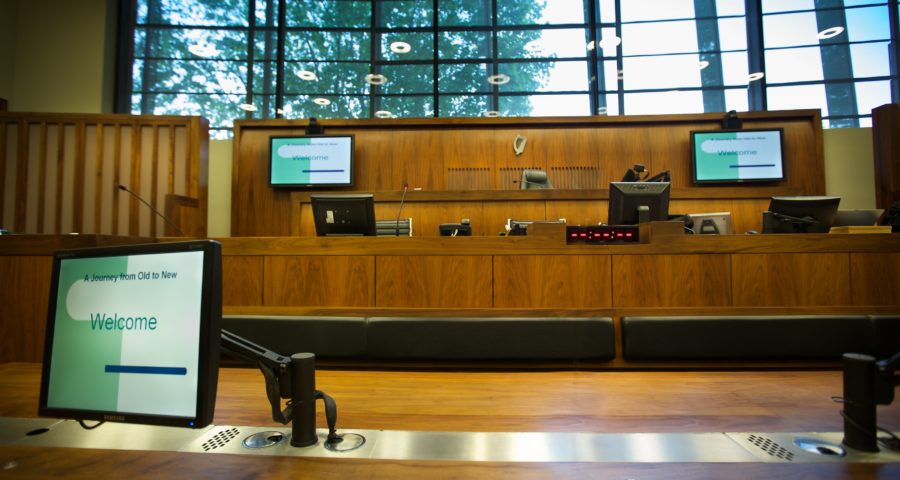The influential, cross party Justice Select Committee has called on the Ministry of Justice to evaluate the impact of court reform against the legal standard of access to justice summarised in TLEF’s “Digital Justice” report. TLEF’s Director of Research, Dr Natalie Byrom argues that HMCTS must act now to embed this four-part access to justice standard into the design and iteration of projects that are currently underway. Projects currently being piloted, such as Continuous Online Resolution in the Social Security and Child Support Tribunal, must not be signed off until there is data to demonstrate that reformed systems maintain or enhance access to justice.
Yesterday, the Justice Select Committee published the report of their inquiry into the ongoing programme of court modernisation taking place across England and Wales. The report covers the requirement to evaluate the reforms underway in some detail and, in particular, adopts the recommendations proposed in the TLEF Digital Justice report. The Justice Select Committee report states that :
“The Ministry of Justice should be as transparent as possible in its evaluation of the reforms. We recommend that the following evaluation approaches are adopted:
- projects within the reform programme, and the programme as a whole, should be evaluated against the access to justice standards set out in law: these can be broadly summarised as (a) access to the formal legal system (b) access to a fair and effective hearing (c) access to a decision and (d) access to an outcome;
- evaluation should prioritise monitoring the impact on access to justice for digitally excluded and vulnerable people, with a particular focus on justice outcomes rather than on processes alone;
- the transfer to digital systems should be used as an opportunity to collect detailed, anonymised data on the operation of courts and tribunals and the experiences of users by reference to their personal characteristics;”
HMCTS has promised to respond fully to the report of the Justice Select Committee “in due course”. What should this response contain?
1. A commitment to ensure that ongoing project level “evaluative activity” measures the impact of projects (such as new digital processes or individual court closures) on access to justice
When the Ministry of Justice and HMCTS speak about their work to assess the impact of reform they refer to two distinct areas of work- an overarching evaluation which is led by the Ministry of Justice and is yet to commence, and “evaluation and evaluative activity” which is led by HMCTS and takes place at the individual project level. It is this latter activity that HMCTS Change Director Richard Goodman referred to as “taking place constantly in the background of reform”[see para 202].
Importantly, and as the Justice Select Committee rightly highlighted, the “evaluation and evaluative activity” undertaken at project level does not consider the impact of projects on access to justice focussing narrowly instead on evaluating whether projects do what they are intended to do within their own terms e.g. does the video-link work? [per paras 202 and 210].
Urgent action must now be taken to ensure that the “evaluative activity” undertaken by HMCTS examines the impact of individual projects on access to justice, with particular reference to those who are vulnerable. Process evaluations that do not consider the impact of reform projects on access to justice are wholly insufficient, as, by the time the overarching evaluation led by the Ministry of Justice reports, it will be too late to address any issues identified.
2. A commitment to publish access to justice impact assessments for each reform project
As the Justice Select Committee has highlighted, it is imperative that HMCTS embeds access to justice principles in the design of each new project or service (e.g. Online Civil Money Claims, Continuous Online Resolution in Social Security and Child Support Tribunals, an individual court closure). One method of achieving this would be to for HMCTS to publish, at stage 2 of the HMCTS project cycle, an access to justice impact assessment which answers three questions:
i.) What proportion of users of the service that is being reformed have characteristics that might cause them to be considered vulnerable under existing law and practice directions? (For a list of the thirteen data-points needed to identify vulnerability, please see here, pp5)
ii.) What impact will the introduction of this service have on elements of the minimum legal definition of access to justice, which comprises
1. Access to the formal legal system?
2. Access to a fair and effective hearing?
3. Access to a judicial determination?
4. Access to outcomes?
In answering this question, HMCTS should have particular reference to the impact on the vulnerable users identified in response to (i.).
iii.) What data collection and analysis will be undertaken to monitor any negative impacts on access to justice, if identified?
Completing and publishing these assessments would ensure that the teams designing and implementing reform projects have effective processes in place for monitoring whether projects achieve their overarching aim of supporting the rule of law and maintaining access to justice.
3.) A guarantee that reformed services will not be signed off without leadership judges and others being provided with the data to demonstrate that access to justice is maintained or improved.
In 2018, the Senior President of Tribunals, Sir Ernest Ryder set out the six principles against which reform projects would be “tested, and if successful, implemented” . The first of these principles is to: “1. Ensure justice is accessible to those who need it, i.e. to improve or maintain access to justice”. To date, HMCTS has not collected the data to facilitate assessments as to whether projects are successful at maintaining or improving access to justice. Introducing the access to justice impact assessments described above would facilitate the capture of this data.
Why does this matter? Because for many people, especially those who are vulnerable, the justice system offers vital protection, not least against poor government decision making. In a recent speech the Senior President of Tribunals reported that if you bring an appeal against a decision made in respect of personal independence payments, there is a 73% likelihood of success. In this context, it is vital that the justice system is accessible to all those who need it. HMCTS should guarantee that pilots, including the ongoing project introducing Continuous Online Resolution in the Social Security and Child Support Tribunal, will not be signed off until they are able to provide evidence that they maintain or improve access to justice, as defined by law.



